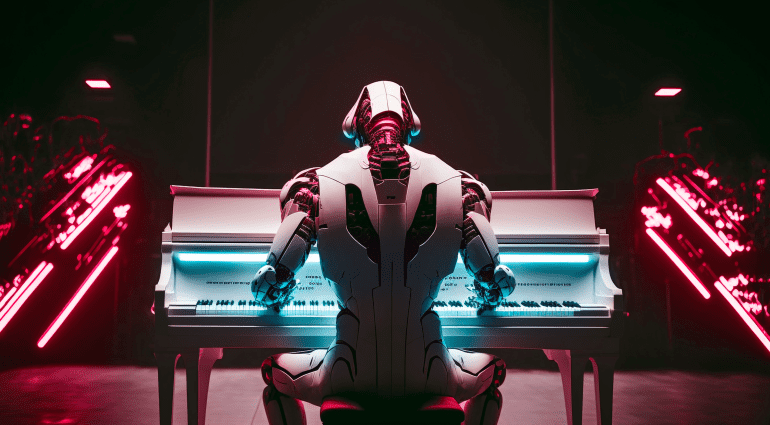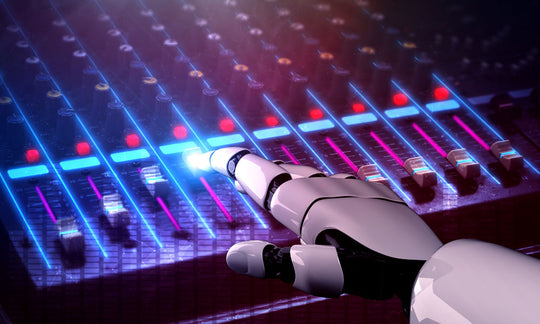AI in music production is unleashing a new wave of artistic possibilities, at times blurring the lines between creative partner and composer competitor. As machine learning continues to advance, the music industry is faced with new opportunities and challenges, including the ability to produce high-quality pieces with ease.
However, can machines ever replace human creativity and artistry? Is AI just a tool for music production or a threat to the very existence of human composers? We’ll explore the rise of AI in music production and its impact on the industry.
From the benefits and drawbacks of using AI to create music to the ethical considerations surrounding its use, we’ll take a closer look at the role of AI in music production.

Credit: www.thomann.de
Benefits Of Ai In Music Production
AI in music production offers a range of benefits, including faster music production, better sound quality, and more creative output. While AI may be seen as a competitor to human composers, it can also serve as a helpful creative partner, offering input and inspiration to enhance the final product.
With the rise of AI in music production, the possibilities for innovation and collaboration are endless.
The emergence of artificial intelligence (AI) in music production has completely transformed the industry, from the way music is produced to how it is consumed. In this post, we will delve into the benefits of AI in music production, exploring how it has made the process more efficient, consistent, and creative.
Efficiency And Speed
Using AI in music production has significantly improved efficiency, making the process faster and more streamlined. AI tools can automate time-consuming tasks such as audio editing and mixing, allowing music producers to focus on more creative aspects of production. AI can also quickly analyze large datasets about different music genres, allowing producers to produce music that is unique and highly personalized.
Consistency And Accuracy
One significant issue in music production is maintaining consistency throughout a track. AI-powered tools can ensure that every aspect of a track sounds consistent and accurate, resulting in a polished final product. By analyzing previously produced tracks, AI can identify irregularities and correct them, ensuring the track sounds perfect. This also makes it easier to maintain a consistent sound throughout an album, making the music much more enjoyable for listeners.
Exploring New Creative Avenues
AI is not just a time-saver or efficiency booster. It can help producers unleash their creativity by exploring new avenues that they haven’t thought of before. AI-powered plugins, for instance, can add new sounds to an existing piece of music, inspiring producers to take their music in new directions. These tools can analyze a melody and suggest new harmonies that can be added to the track. AI can also help producers identify which sounds and samples work best together, leading to more innovative and original compositions. Overall, AI has proven to be a valuable partner in music production. The advantages are clear- it speeds up production time, ensures accuracy and consistency, and helps producers explore new creative avenues. Music producers who embrace AI and use it as a tool rather than a competitor will reap the benefits of producing high-quality tracks in less time.

Credit: www.masteringthemix.com
Drawbacks Of Ai In Music Production
AI in music production has its drawbacks. While it can be a creative partner, it can also be a composer competitor, taking away opportunities for human musicians. Additionally, AI-generated music lacks the emotional connection that comes with human-made music.
Lack Of Emotional Connection
AI in music production may not be able to capture the essence of the human soul that goes into creating music. It may lack the emotions, the rawness, and the soul that musicians put into their compositions. There is no substitute for the human connection and creativity that can be felt in a live performance. AI can only follow set patterns and algorithms, which may lack depth and genuineness. While it may be faster and more efficient, it cannot replicate the complexity of emotions that go into music creation.
Limitations In Improvisation
One of the biggest drawbacks of AI in music production is its inability to improvise. While it can create music based on algorithms and patterns, it cannot respond to the emotional and spontaneous elements that drive improvisation. Musicians can create something entirely new and unscripted while performing live, which is impossible to replicate by AI. Music created by AI may lack the creativity and unpredictability that comes naturally to a human musician.
Potential Loss Of Jobs For Musicians
As AI technology improves, there is a possibility of it replacing human musicians, which could lead to job loss. The creative collaboration and human touch in music production may be lost, making it harder for musicians to earn a living. It may also lead to a lack of diversity in music, as AI may only be programmed to create music based on popular trends or patterns. While it may offer convenience and cost savings, it could hurt the music industry’s revenue, leading to fewer opportunities for aspiring musicians.
Ai In The Music Industry: Current And Future Trends
The music industry has undergone significant changes over the past few years, especially since AI has made its way into the creative space. As AI-powered systems continue to evolve, they are changing how music is created, produced, and distributed. With this, the industry is experiencing unprecedented growth. In this post, we’ll explore the current and future trends of AI in the music industry, including AI-powered music creation tools, integration of AI in music streaming services, and AI-generated music for film and advertising.
Ai-powered Music Creation Tools
The use of AI in music creation is attractive to artists and producers alike because it makes the process faster and easier by automating tedious tasks that would otherwise have to be done manually. Today’s AI-powered music creation tools can generate track ideas, chord progressions, melodies, and even lyrics, reducing the time required to create a track from several hours to a few minutes.
A good example of an AI-powered music-creation tool is Amper Music, which uses machine learning algorithms to compose music based on inputs from users. Amper Music also allows creators to customize the length, mood, and instrumentation of the tracks before exporting them, so they can match the needs of a specific project.
Integration Of Ai In Music Streaming Services
Music streaming services like Spotify and Apple Music are increasingly using AI technology to curate playlists based on users’ listening traits. These services gather data on listening habits, track skips, and user feedback, which are then used to make better suggestions as to what music to recommend. This move is beneficial for both the user and artists as AI-powered algorithms can help to surface tracks that would otherwise be hidden to the listener, providing increased exposure for new and budding artists.
Another example is Pandora’s Music Genome Project, which has been using machine learning to power its music recommendation engine since 2019. The project helps to classify songs based on hundreds of attributes, including genre, instrumentation, and key signature, to create personalized playlists based on a user’s musical tastes.
Ai-generated Music For Film And Advertising
Another trend in the music industry arising alongside AI is the development of AI-generated music for film and advertising. AI-generated music has become more sophisticated, and this is reflected in its ability to create dynamic, emotive, and mood-setting soundtracks that can match a specific visual narrative. AI-generated music can put together tunes that resonate with the emotions of target audiences and customers, resulting in more effective marketing campaigns.
A good example is Jukedeck’s AI software that can generate royalty-free music tailored to fit the creative needs of the project’s creators. Jukedeck’s system has been used by Hilton and Samsung and offers filmmakers and advertising agencies limitless, royalty-free, and custom-made music options for their projects.
Conclusion
AI continues to have a significant impact on the music industry, freeing up time for creators and producers, assisting music streaming services to provide better recommendations, and generating royalty-free music for filmmakers and advertisers. As AI-powered systems continue to learn and evolve, it’s inevitable that we’ll see further widespread use across the entire industry.

Credit: www.masteringthemix.com
Frequently Asked Questions For The Rise Of Ai In Music Production Creative Partner Or Composer Competitor
Will Ai Replace Music Composers?
AI may assist in music composing, but it can’t replace human creativity, emotions, and interpretation. The human touch adds a unique flavor to music, and AI can’t match that. Therefore, music composers will remain relevant and essential for the music industry’s growth and harmony.
How Has Ai Impacted The Music Industry?
AI has revolutionized the music industry by enhancing music production, analyzing data to increase revenue, and personalizing user experiences. With AI, music can now be created by machines through different algorithms, allowing a high degree of creativity and diversity in content.
It also enables a better understanding of user preferences, facilitating targeted marketing and revenue optimization. AI has transformed the music industry by streamlining the creative process and improving engagement.
Is There An Ai That Can Compose Music?
Yes, there are AI programs that can compose music. There are several companies working on AI music composition, which uses machine learning algorithms to analyze existing music and create new compositions. These AI programs can save musicians time on creating new compositions and provide them with unique ideas.
Who Was The First Ai Music Composer?
The first AI music composer is considered to be David Cope, who created the software program called “Experiments in Musical Intelligence” (EMI) in the 1980s. EMI was able to create original compositions in various genres and styles based on existing musical data.
Conclusion
As AI technology continues to advance, its integration into music production is becoming more prominent. While some fear that AI might replace human composers, it’s important to recognize that AI can serve as a valuable creative partner. By generating ideas and assisting in the composition process, AI has the potential to enhance the speed and quality of music production.
Ultimately, the rise of AI in music production could pave the way for innovative collaborations between man and machine.